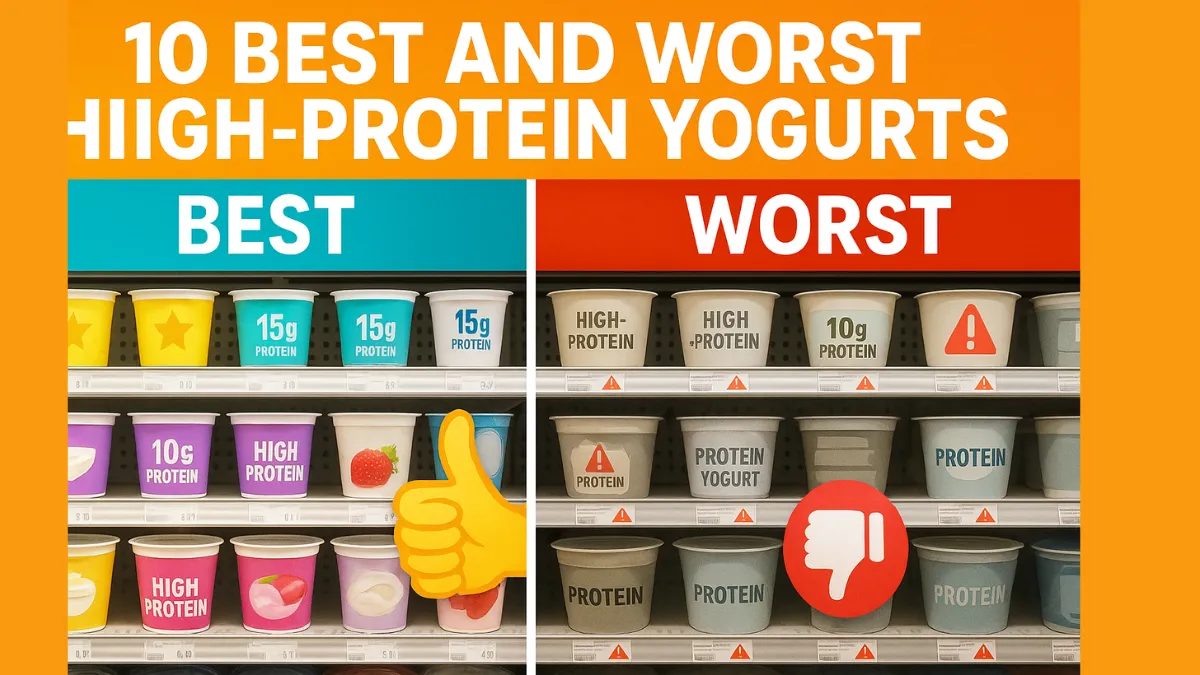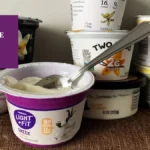If you’re serious about eating clean, building muscle, or just finding healthy snack options, yogurt is likely already in your rotation. But not all yogurts are created equal—some are packed with high-quality protein and gut-boosting probiotics, while others are sugar bombs disguised as health food. So, how do you know which ones are actually good for you?
We’ve rounded up the 10 best and worst high-protein yogurts you’ll find at your local grocery store. From creamy Icelandic skyr to sugar-heavy “fruit on the bottom” cups, this guide will help you make smarter choices for your fitness, wellness, and taste buds.
Best: Siggi’s Icelandic Skyr Yogurt
Siggi’s is a standout in the high-protein yogurt world. Technically classified as a cheese in Iceland, skyr offers a thick, creamy texture that’s loaded with about 15 to 19 grams of protein per serving. What makes Siggi’s shine is its commitment to clean ingredients—just milk and live active cultures, with no added sugar or artificial junk.
The taste is mildly tangy, making it feel more like a satisfying snack than a dessert. Bonus: the milk comes from grass-fed cows, which is a win for ethically minded eaters. If you’re looking to stay full longer without the sugar crash, Siggi’s is your go-to.
Best: FAGE Total 0% Greek Yogurt
FAGE Total 0% is a Greek yogurt favorite for athletes and health-conscious eaters alike. Each 170-gram serving delivers a whopping 18 grams of protein, all without added sugar or fat. It’s ultra-thick, smooth, and perfectly tangy.
Whether you mix it with berries, use it as a sour cream swap, or blend it into smoothies, this yogurt fits seamlessly into almost any meal plan. Its versatility and protein power make it a fridge staple for anyone serious about clean eating.
Best: Chobani Non-Fat Greek Yogurt
Chobani has built a loyal fan base for good reason. Its non-fat Greek yogurt offers 14 to 17 grams of protein per serving and features natural, non-GMO ingredients. The brand’s wide flavor range includes options sweetened with real fruit, while the plain version is ideal for low-sugar diets.
Live active cultures support gut health, and its thick, creamy texture works great in everything from smoothies to savory recipes. If you’re looking for affordability, accessibility, and nutrition, Chobani is a solid bet.
Best: Oikos Triple Zero Greek Yogurt
Oikos Triple Zero is perfect for fitness lovers watching their sugar intake. It packs 15 grams of protein with zero added sugar, zero artificial sweeteners, and zero fat—hence the name. Sweetened naturally with stevia, this yogurt delivers on flavor without the crash.
It also contains 3 grams of fiber, which is rare for yogurts but great for digestion and satiety. Available in a range of flavors like vanilla and mixed berry, Oikos Triple Zero is both delicious and diet-friendly.
Best: Two Good Greek Low-Fat Yogurt
If you’re cutting sugar but still want creamy, flavorful yogurt, Two Good is the answer. It contains only 2 grams of sugar and 12 grams of protein per 150-gram serving. The low sugar content is achieved through a slow-straining process, not artificial sweeteners.
With milk sourced from cows not treated with growth hormones, it’s a conscientious choice too. Add it to smoothies or pair it with nuts and seeds for a quick, satisfying snack.
Worst: Yoplait Original Yogurt
Yoplait Original might bring back childhood memories, but it doesn’t deliver on nutrition. Each serving contains only about 5 grams of protein and a hefty 15 to 19 grams of added sugar.
It also includes artificial colors and flavors, making it closer to a dessert than a health food. If you’re trying to fuel your day or recover after a workout, skip this one.
Worst: Dannon Fruit on the Bottom
Dannon’s Fruit on the Bottom yogurt is loaded with added sugars—often over 20 grams per cup—and only gives you around 5 grams of protein. That’s a poor protein-to-sugar ratio for anyone aiming to eat clean or build muscle.
The artificial flavors and preservatives make it even less appealing for health-conscious consumers. While it may taste good, nutritionally it falls flat.
Worst: Noosa Yoghurt
Noosa is rich, indulgent, and dangerously high in sugar. Depending on the flavor, a single serving can pack up to 30 grams of sugar—more than most candy bars!
Despite using whole milk and real fruit purée, Noosa only provides about 7 to 9 grams of protein. It’s fine for an occasional dessert, but not for everyday snacking if your goal is health and fitness.
Worst: Activia Probiotic Yogurt
Activia promotes itself for digestive health, but its protein content is underwhelming—just 4 grams per serving. On top of that, many flavors contain 12 to 16 grams of sugar, which can cancel out the probiotic benefits.
While it might support gut health to some extent, better alternatives offer both probiotics and higher protein content without the sugar spike.
Worst: Yoplait Whips! Yogurt
Yoplait Whips! is airy, sweet, and light—but also light on nutrition. With just 4 to 5 grams of protein and up to 20 grams of sugar, it acts more like a dessert than a functional food.
Add artificial flavors and preservatives to the mix, and it’s clear this isn’t a yogurt you want to rely on for your daily nutrition goals.
Final Thoughts: Choose Yogurt That Works For You
High-protein yogurt can be a game-changer for your diet—helping with muscle repair, weight loss, and sustained energy. But it’s easy to get misled by labels that make sugary options seem healthy.
Stick with brands that list few ingredients, deliver solid protein (12g+ per serving), and keep sugars low. Whether you’re blending a breakfast smoothie or grabbing a post-gym snack, a little label-reading goes a long way.
FAQs
Q1: Why is high-protein yogurt better than regular yogurt?
High-protein yogurt helps keep you fuller longer, supports muscle recovery, and often contains fewer added sugars compared to standard yogurts.
Q2: Is Greek yogurt always high in protein?
Most Greek yogurts are higher in protein than regular yogurts, but always check the label — some flavored versions can have more sugar and less protein.
Q3: Can high-protein yogurt help with weight loss?
Yes! High-protein yogurts can curb hunger and reduce overeating by increasing feelings of fullness, making them a great option for weight management.
Q4: What should I avoid when choosing yogurt?
Avoid yogurts with high added sugar, artificial flavors, and low protein content. Look for simple ingredients and at least 10 grams of protein per serving.




